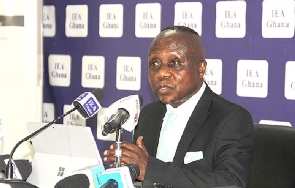 Dr. John Kwakye, Director of Research at the Institute of Economic Affairs (IEA)
Dr. John Kwakye, Director of Research at the Institute of Economic Affairs (IEA)
The Director of Research at the Institute of Economic Affairs (IEA) Dr. John Kwakye admonished the Bank of Ghana to force the government to manage its budget outside of the banking sector. According to Dr. Kwakye, he finds it difficult to understand why the central bank will continue to finance the budget of successive governments. His suggestions came on the back of the Monetary Policy Committee of the Bank of Ghana (BoG) hiked the monetary policy rates by 250 basis points from 22 percent to 24.5 percent. According to the central bank, the move is expected to stem the inflation which has been soaring recently due to the cedi depreciation, upward adjustment in tariffs, and Ghana’s awaiting the IMF-supported programme. Meanwhile, the Governor of the Bank of Ghana, Dr. Addison at a press conference Thursday, October 6, 2022, at the 108th Monetary Policy Committee (MPC) commenting on the fiscal situation said the expenditures have been broadly on target, revenue performance has been below expectations, complicating fiscal policy implementation. “Financing the budget so far has been predominantly done by the banking sector with the central bank absorbing a larger share. Persistence uncovered auctions and portfolio reversals by non-resident investors continue to post risk to the financing of the budget resulting in the monetization of the budget deficit by the central bank,” the economist said. Sharing his views on the development in a Twitter post, Dr John Kwakye stated the government must be compelled to manage its budget outside of the banking sector. “Why should the central bank continue to finance the budget? Doesn’t that further fuel inflation and cedi depreciation? “Why doesn’t the central bank force Gov’t to pay the right price and finance the budget outside the bank? So, this is what we had to wait for IMF input for?” the researcher questioned.
The Director of Research at the Institute of Economic Affairs (IEA) Dr. John Kwakye admonished the Bank of Ghana to force the government to manage its budget outside of the banking sector. According to Dr. Kwakye, he finds it difficult to understand why the central bank will continue to finance the budget of successive governments. His suggestions came on the back of the Monetary Policy Committee of the Bank of Ghana (BoG) hiked the monetary policy rates by 250 basis points from 22 percent to 24.5 percent. According to the central bank, the move is expected to stem the inflation which has been soaring recently due to the cedi depreciation, upward adjustment in tariffs, and Ghana’s awaiting the IMF-supported programme. Meanwhile, the Governor of the Bank of Ghana, Dr. Addison at a press conference Thursday, October 6, 2022, at the 108th Monetary Policy Committee (MPC) commenting on the fiscal situation said the expenditures have been broadly on target, revenue performance has been below expectations, complicating fiscal policy implementation. “Financing the budget so far has been predominantly done by the banking sector with the central bank absorbing a larger share. Persistence uncovered auctions and portfolio reversals by non-resident investors continue to post risk to the financing of the budget resulting in the monetization of the budget deficit by the central bank,” the economist said. Sharing his views on the development in a Twitter post, Dr John Kwakye stated the government must be compelled to manage its budget outside of the banking sector. “Why should the central bank continue to finance the budget? Doesn’t that further fuel inflation and cedi depreciation? “Why doesn’t the central bank force Gov’t to pay the right price and finance the budget outside the bank? So, this is what we had to wait for IMF input for?” the researcher questioned.